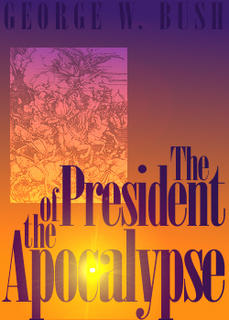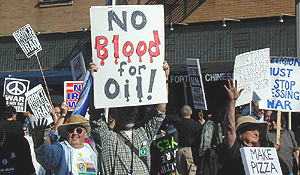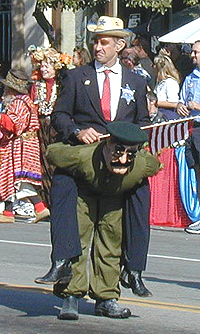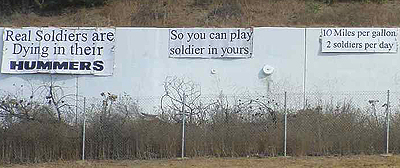 And now I learn that Enron is one of the dots. As the plot of this spellbinding novel of deadly international intrigue has unfolded from •Rovegate back through the •Downing Street Memo, I learned that •John Bolton and even •Jeff Gannon/Guckert are involved along with more familiar names like •Rumsfeld, •Miller and •Libby. But the trail of dots doesn't stop at 10 Downing Street in 2002. It continues back from there through 1999 with Mickey Herskowitz's revelation that candidate Bush was •looking forward to having the opportunity to invade Iraq if elected President.
And now I learn that Enron is one of the dots. As the plot of this spellbinding novel of deadly international intrigue has unfolded from •Rovegate back through the •Downing Street Memo, I learned that •John Bolton and even •Jeff Gannon/Guckert are involved along with more familiar names like •Rumsfeld, •Miller and •Libby. But the trail of dots doesn't stop at 10 Downing Street in 2002. It continues back from there through 1999 with Mickey Herskowitz's revelation that candidate Bush was •looking forward to having the opportunity to invade Iraq if elected President.But it also doesn't stop there. John Loftus, a former Justice Department prosecutor, wrote in an article on 31 May 2002:
In the early 1990’s, a [•]consortium of American oil companies (lead by Unocal) had hired [•]Enron to determine the profitability of building an oil and gas pipeline across Afghanistan.Having now learned this, I'm surprised that the right isn't beating the drums about Clinton's coverup of the pipeline negotiations being solely responsible for 9/11 and the war in Iraq. However, the left does need to accept the fact that the Clinton administration shares part of the blame for allowing the situation to go on as long as it did. According to Loftus, "The Taliban negotiations temporarily collapsed in 1999 after Clinton reversed his NSC advisor's policy, and ordered a missile strike against terrorists in Afghanistan." But during the first month of the Bush presidency, Cheney "allegedly reinstated the [•]intelligence block and expanded it to effectively preclude any investigations whatsoever of Saudi-Taliban-Afghan oil connections."
...
Former Afghanistan CIA agent [•]Robert Baer has recently published a book charging that the cover-up of the 1990's pipeline negotiations [with the •Taliban] revealed extensive financial corruption inside the [•]Clinton administration, and contributed to the lack of intelligence before 9/11.
And, as you can probably guess, it doesn't stop there. The dot that precedes Clinton is •Bush Sr., who, according to Loftus (but with no supporting information, so caveat lector regarding Loftus), "was business partners in the Carlyle Group with the [•]Bin Laden family during this period." Loftus states that Bush Sr. "lectured" Bush Jr. that he should placate the Saudis. Loftus then writes that Bush Jr. ignored his father's advice
and secrtely ordered all American troops to begin a total withdrawal from Saudi Arabia. White House sources began a steady drumbeat of leaks about Saudi involvement with terrorism, and even authorized long-delayed raids on the Saudi charities in Virginia that served as a money laundry for terrorist operations against Israel.But it doesn't stop there. To follow the dots to their logical origin, we need to go all the way back to the Soviet invasion of Afghanistan in December 1979, when Carter had one year left in his term. According to Loftus:
Suddenly, President Bush made a sudden and startling switch to adopt a more pro-Saudi view. The [•]documents seized in the Virginia raids are barely being translated, let alone investigated.
...
A plausible explanation for the dramatic policy reversal is that someone (allegedly Cheney) told President Bush to call off the dogs at CIA and FBI, because if the Saudis went down, they would take his father down with them.
[•]Saudi intelligence (not the CIA as has been reported) funded the early Taliban faction and later [•]Al Qaida as part of the insurgency to throw the Russians out of Afghanistan. A few years afterwards, US energy companies (Enron, as the Afghan pipeline consultant for UNOCAL) used the Saudi intelligence connection to the Taliban to begin negotiations for a pipeline across Afghanistan.It's doubtful that the negotiations with the Taliban had begun yet in the final year of the Carter presidency, and so the origin dot should be placed within the •Reagan administration. An oil pipeline was dreamed up by American energy companies, and negotiations with the Taliban were subsequently covered up by the Reagan, Bush Sr., Clinton and Bush Jr. administrations. Those negotiations finally collapsed in August 2001, precipitating the 9/11 attacks.
AfterDowningStreet.org offers a detailed timeline that begins on 1 December 1998 with Wolfowitz publishing an •article stating that •Saddam must be taken out.
Following is a sampling from the timeline.
On 16 December 2000, •Powell states that "Saddam Hussein is sitting on a failed regime that is not going to be around in a few years' time."
In February 2001, the Bush administration suggests that replacements for Saddam be interviewed.
On 24 February 2001, Powell states that Saddam "has not developed a significant capability with respect to weapons of mass destruction."
On 11 September 2001, Rumsfeld is quoted as saying "[I want the] best info fast. Judge whether good enough hit S.H. [Saddam Hussein] at same time. Not only UBL [Usama bin Laden]. ... Go massive. Sweep it all up. Things related and not."
On 20 September 2001, Bush tells •Blair "We must deal with this first. But when we have dealt with Afghanistan, we must come back to Iraq."
In February 2002, Senator Bob Graham is told "We have stopped fighting the war on terror in Afghanistan. We are [•]moving military and intelligence personnel and resources out of Afghanistan to get ready for a future war in Iraq."
From June 2002 to March 2003, •"Allies flew 21,736 sorties over southern Iraq, attacking 349 carefully selected targets."
In July 2002, "They get the [•]money [to prepare for the invasion of Iraq] from a supplemental appropriation for the Afghan War, which Congress has approved...Congress was totally in the dark on this."
23 July 2002: The Downing Street Minutes are written.
In September 2002, the Defense Intelligence Agency reports "There is no reliable information on whether Iraq is producing and stockpiling chemical weapons."
On 18 September 2002, Saddam offers to allow inspectors to return and Bush •calls this "his latest ploy."

At the Doo-Dah Parade in Pasadena, California on 24 November 2002.

28 January 2003: The •State of the Union Address includes "sought significant quantities of uranium from Africa."
20 March 2003: U.S. forces •invade Iraq.
On 30 March 2003, Rumsfeld pinpoints WMD in Tikrit and Baghdad in an ABC interview.
1 May 2003: "Mission Accomplished."
On 14 May 2003, Rumsfeld says "I don't believe anyone that I know in the administration ever said that Iraq had nuclear weapons."
On 6 July 2003, •Wilson concludes "that some of the intelligence related to Iraq's nuclear weapons program was twisted to exaggerate the Iraqi threat."
11 July 2003: Rove's conversation with •Cooper.
14 July 2003: •Novak outs •Plame.
16 September 2003: •McClellan denies Rove involvement.
On 22 January 2004, Special Prosecutor •Patrick Fitzgerald presents a grand jury with evidence regarding the Plame leak.
6 October 2004: The Duelfer Report regarding WMD is published.
1 May 2005: The Downing Street Memo is leaked.
7 June 2005: Bush says "There is nothing farther from the truth. My conversation with the prime minister was, 'How can we do this peacefully?'"
So...as it turns out, if you connect the dots, you get a detailed picture of an oil pipeline crossing the arid terrain of Afghanistan. Suitable for framing. Free with any purchase, while supplies last.


1 comment:
This is really good dot-connecting, Don.
Post a Comment